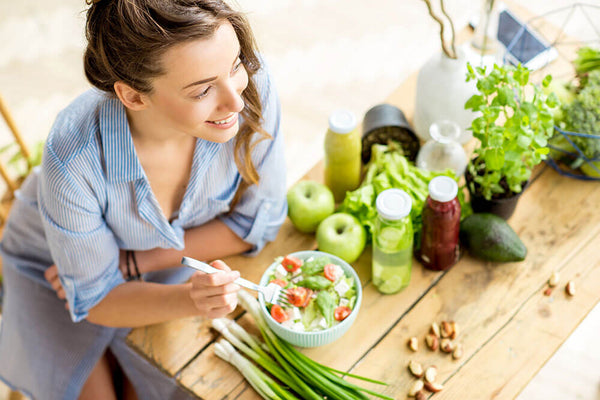There are many reasons why people may choose to follow a vegan lifestyle.
Regardless, whether you avoid eating animal products because of personal convictions or environmental concerns, you’ll still need to ensure you’re getting all of the nutrients you need to stay happy and healthy.
This is because one of the major worries about vegan diets is whether they provide your body with all of the micro and macronutrients it requires.
Many people believe that a whole-food, plant-based diet readily covers all essential nutrient needs.
A few may go so far as to advise vegans to avoid all supplements. Despite its good intentions, this advice tends to cause more harm than good.
Some health supplement companies are dedicated to producing vegan, sugar-free supplements to cover all nutrient gaps that may exist in a vegan diet.
So, what should you look for in a vegan multivitamin?
Let’s look at some of the most crucial vitamins and minerals to include in your vegan multivitamin supplement, as well as why they’re so vital.
What to look for in a vegan supplement
Although consuming various plant-based foods may provide most of your nutrition needs, some vegans choose to balance their diets even further with minerals and vitamins.
However, the biggest problem with most vitamins is that they’re designed with animals in mind, meaning they may contain byproducts that you, as a vegan, do not want to consume.
Even if you don’t go all-in on supplements, learning about them and how they can help you live healthier can be life-saving.
Finding it difficult to identify vegan supplements? Read this article to learn how.

The vitamins you really need
Because our bodies cannot produce some of the essential vitamins we require on their own—for example, Vitamin C—we must consume these nutrients through food or supplements. Here are the vitamins you’ll need to supplement your vegan diet:
Vitamin B12
Many biological activities rely on vitamin B12, including protein metabolism and the creation of oxygen-transporting red blood cells.
It is obtained naturally from eating fresh, unwashed plants.
However, since we wash our veggies before eating them (for a good cause), we have erased any traces of B12 that must have existed. Also, modern food production isn’t doing us any good bathing our veggies in chlorine or other sterilizing solutions.
Although anyone can have reduced vitamin B12 levels, some studies demonstrate that vegetarians and vegans are at higher risk of insufficiency. This seems more accurate for vegans who do not supplement their diet.
Vegans can only get the recommended amount of vitamin B12 by eating B12-fortified products or taking a vitamin B12 supplement, which is the only scientifically confirmed method.
Lastly, as you become older, your capacity to absorb vitamin B12 decreases. As a result, the Institute of Medicine advises anybody over 51, vegan or not, to seek fortified meals or a vitamin B12 supplement.
Vitamin D
Vitamin D is required for strong bones, teeth, muscles, and various metabolic functions.
It is created in the skin when exposed to sunlight, and for most people, this is their primary source of vitamin D.
Unfortunately, few foods contain vitamin D innately, and foods enhanced with vitamin D are frequently regarded as insufficient to meet daily requirements.
This could help to explain why there are so many indications of vitamin D deficiency between several vegans and omnivores alike.
Having their blood levels checked is the most intelligent method for vegans to guarantee they are getting enough vitamin D. Those who don’t get sufficient vitamin D2 or D3 from food products or sunlight should consider taking a vitamin D2 or vegan vitamin D3 supplement on a daily basis.

Iron
Iron is an essential nutrient required for forming red blood cells, new DNA, energy metabolism, and oxygen transport in the blood.
Iron comes in two types: heme and non-heme.
Heme iron can only be obtained from animal products and is easily absorbed by the body, while non-heme iron is sourced from plants but is harder to absorb.
So, the best and most effective way for vegans who would avoid heme iron from animal sources is through supplementation.
Most doctors recommend combining your iron supplements with vitamin C or orange juice. This combo aids iron absorption in your body.
Iron and Vitamin C vegan gummies were designed explicitly for this purpose. The combination provides a clinically-proven approach for your body to absorb enough non-heme iron.
The supplement is suitable for adults and kids aged three and above.
Omega-3 DHA
Long-chain omega-3 fatty acids are structurally and medically essential for the brain and eyes.
A healthy diet appears to be essential for brain development as well as lowering the risk of depression, inflammation, breast cancer, and attention deficit hyperactivity disorder (ADHD)
Walnuts, soybeans, hemp seeds, chia seeds, and Flax seeds are examples of plants with high ALA content. Eicosapentaenoic Acid (EPA) and Docosahexaenoic Acid (DHA) are primarily found in animal products such as fatty fish and fish oil.
Most experts believe that 200–300 mg a day should be adequate. Vegans can meet this requirement by supplementing with algae oil.
Iodine
Iodine is essential for healthy thyroid function, which regulates your metabolic activity.
Lack of Iodine during pregnancy and childhood can cause permanent intellectual disability.
Vegans are in danger of iodine deficiency, and studies show that they have up to 50 per cent lower blood iodine levels than vegetarians.
The amount of iodine in plant foods is determined by the amount of iodine in the soil in which they were grown. Iodine levels are higher in foods grown near the sea, for example.

Conclusion
What vitamins a vegan should take is not a one-size-fits-all prescription. If you’re following a vegan diet, there are some general rules to follow and some vitamins and minerals that may be better supplemented. Still, only your doctor or nutritionist can identify which type of supplement would work best for you.


